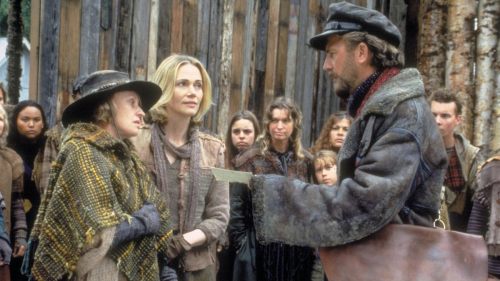Doomed Movie Love Across Generations
All love is doomed to end in tragedy.
God, but that’s grim. It’s cool, though. The basic truth that love, especially romantic love, is going to end is part of what makes it so special. Love would be meaningless if it were not fleeting.
This is something that we, culturally, have struggled to fully internalize, never mind comprehend. This idea, that love is worth seeking even though it must surely end, has been the basis of great art throughout the course of human history. “It is better to have love and lost,” and all that jazz.
All forms of art have their own inimitable methods of communicating. The immediacy of a painting cannot be captured by even the most eloquent poetry. Music affects our souls before our minds in a way that architecture, for all of its ability to utterly transform space, cannot approach. Comic books are unique among the narrative arts in that this medium is the only one that can express internal monologue and external dialogue simultaneously. And then there is cinema.
There is no other art form that can reflect human truths as directly and honestly as movies can. And some of the all-time greatest films have explored the yearning for and ultimate loss of romantic love.
Casablanca, West Side Story and Eternal Sunshine Of The Spotless Mind feature three of our greatest screen romances. But while the stories of Rick and Ilsa, Maria and Tony, and Joel and Clementine are each beautiful and moving and tragic, they also very clearly and very directly speak to their times.
Part of the beauty of great movies lies in the depth of meaning that can be found in them. This is part of what contributes to their timelessness. Love stories in particular hold up well over the years for this very reason. All love stories are metaphorical.
1942’s Casablanca is the story of American expatriate Rick Blaine (Humphrey Bogart), running his bar in the titular city of Casablanca and generally trying to be at peace despite the effects of World War II encroaching on his comfortable life. His life takes a turn when former lover Ilsa Lund (Ingrid Bergman) reenters his life and Rick must decide between winning back Ilsa or helping her husband, Czech Resistance leader Victor Lazlo (Paul Henried), escape Morocco and continue his fight against the Nazis. Rick’s ultimate decision to join the war effort despite the loss of his personal happiness reflects American popular opinion during the years leading to the United States’ entry into the war.
In 1942 America had not yet committed to the war that was engulfing Europe and threatening to overtake the rest of the world. But many Americans at the time felt it was their duty to fight against the Nazis and the Axis forces. Rick’s sacrificing of his love for greater virtue is heroic and inspiring when seen in the context of the generation Casablanca was made for, a call to arms against a tyrannical force even if it means surrendering personal comfort.
Skip ahead nearly twenty years to 1961’s West Side Story, an adaptation of the 1957 stage play of the same name and one of the best musicals ever put to film, and we can see that the theme of the tragic end of love is still being explored and used to reflect the world. But where the loss of Rick and Ilsa’s love in Casablanca is seen as righteous sacrifice in service of a greater good, West Side Story’s central romance is tragic in the classic sense of the word. In the film Tony Wyzek (Richard Beymer, with a vocal assist from Jimmy Bryant), the former leader of the New York City street gang the Jets, falls in love with Maria Nuñez (Natalie Wood, with Marni Nixon singing), who is closely associated with the Puerto Rican rival gang the Sharks. Maria and Tony’s budding romance stands in stark contrast against the rising tensions between the Jets and Sharks, tensions that lead to violence and dire consequences for all involved.
Tony eventually finds himself dragged into the escalating conflict, avenging the murder of his best friend and setting in motion a cycle of violence that only ends with Maria’s impassioned and terrifying reaction to his own death. West Side Story is explicitly about race relations and the hardships New York City was facing in the late ‘50s and early ‘60s. Maria and Tony’s tragic romance is a warning against that escalating violence and hatred.
Decades later, Michael Gondry and Charlie Kaufman explored the notion of romance and memory in the 21st century with Eternal Sunshine Of The Spotless Mind. The premise -- two people meet for the first time after having their entire previous relationship erased from their memories -- is indicative of a generation desperate to run from pain and hardship without understanding what that actually entails.
Do you remember 2004? 2004 was a garbage year. It was the perfect time for Eternal Sunshine Of The Spotless Mind to hit the popular consciousness and eviscerate the very idea of denial. Jim Carrey and Kate Winslet play Joel Barish and Clementine Kruczynski, and through a series of flashbacks in the form of Joel having his memories of Clementine erased, we see the entire course of their relationship play out, from stale and bitter ending to promising, hopeful start. At the end of the film, Joel and Clementine have rekindled the relationship they didn’t know they had allowed to extinguish, only to be confronted with the worst parts of that relationship. And they fall in love anyway.
That’s the underlying truth of these three films. Love hurts. In Casablanca love leads to sacrifice. In West Side Story it leads to suffering, but a suffering that heals all wounds. And in Eternal Sunshine Of The Spotless Mind love is stubborn and bull-headed and maybe idiotic, even (especially!) in the face of disaster.
All love is doomed to end in tragedy. And it is always, always worth it.
This was originally published in the February edition of Birth.Movies.Death. You can see Casablanca, West Side Story and Eternal Sunshine at the Alamo Drafthouse this month!



